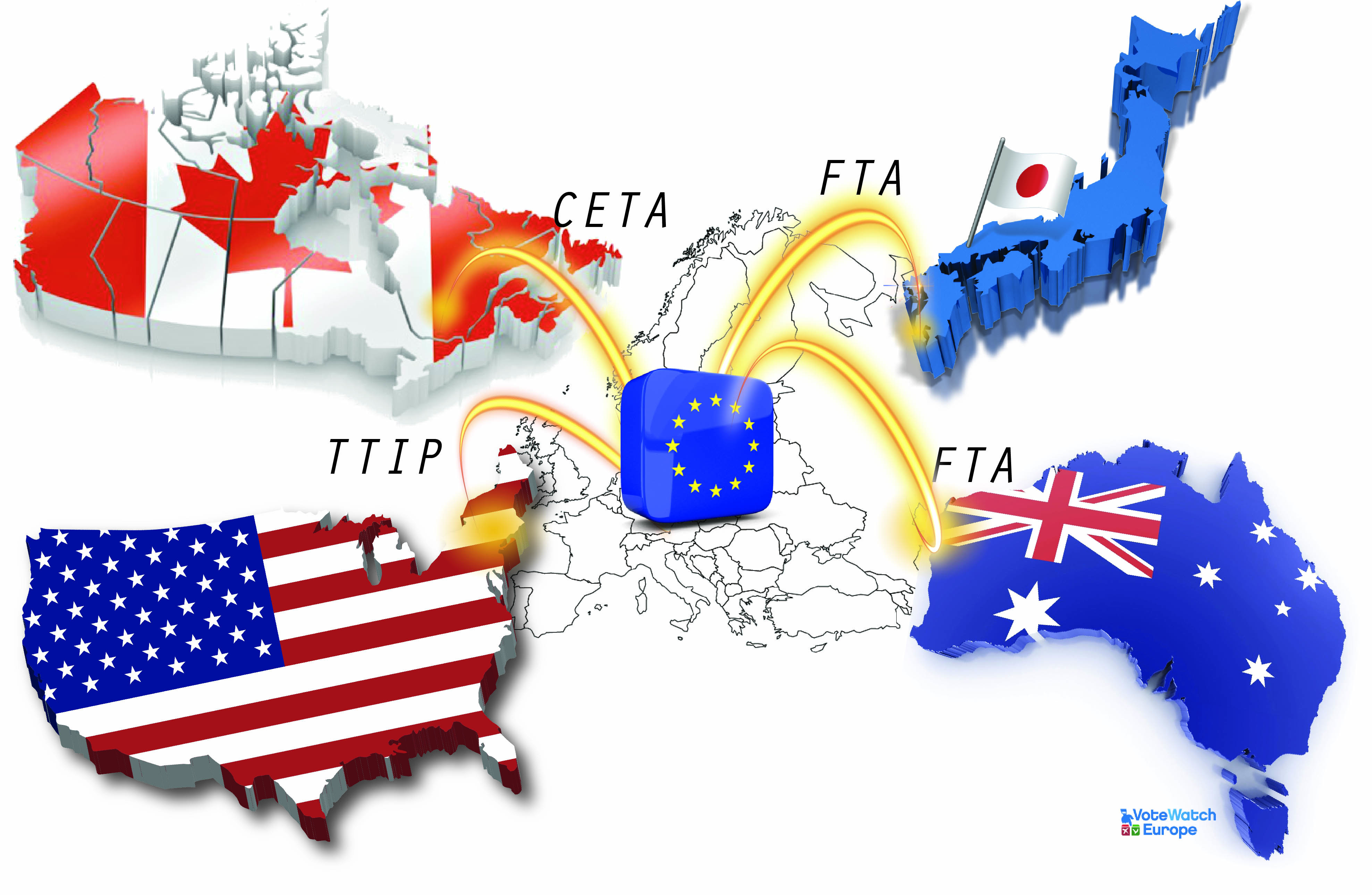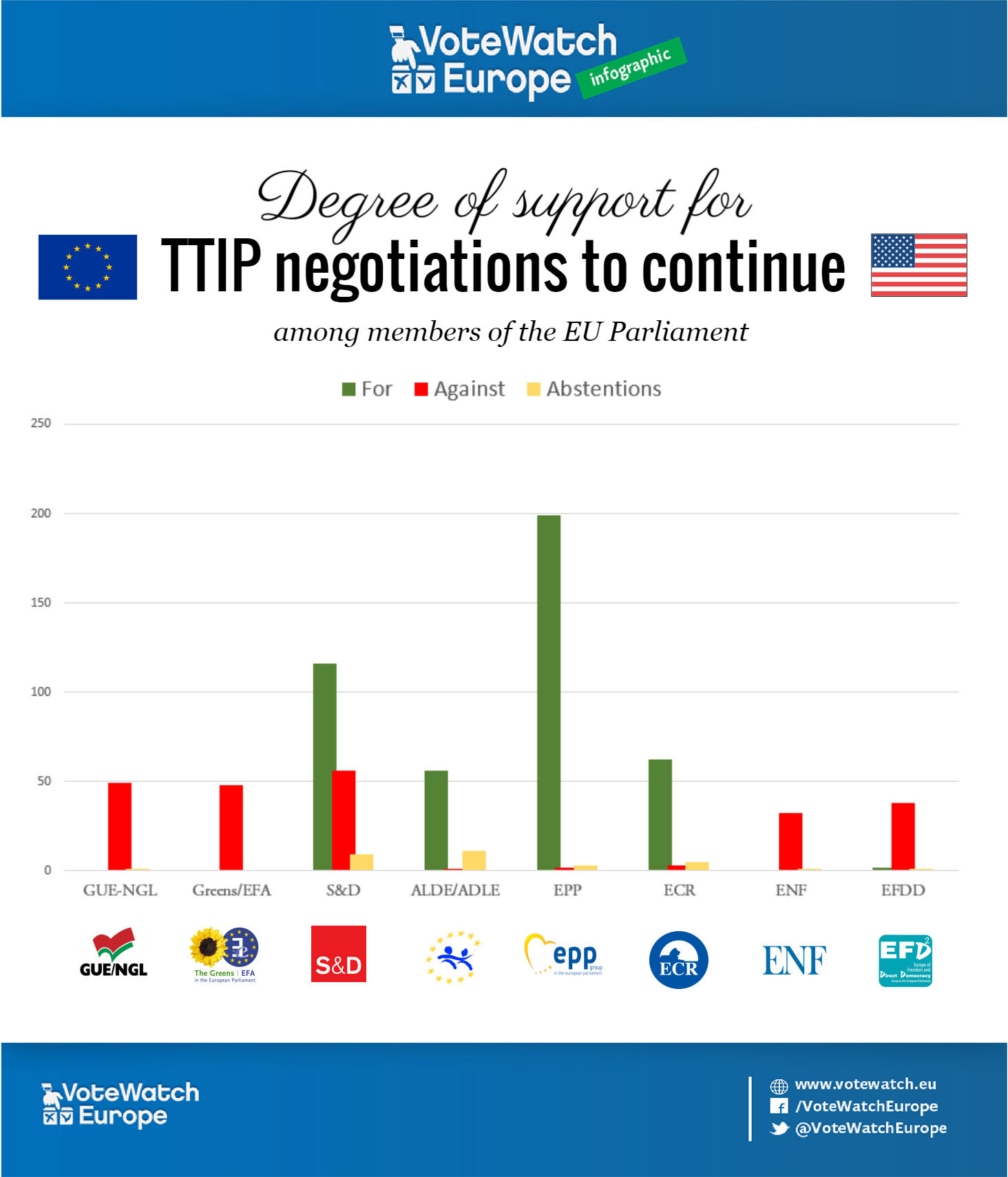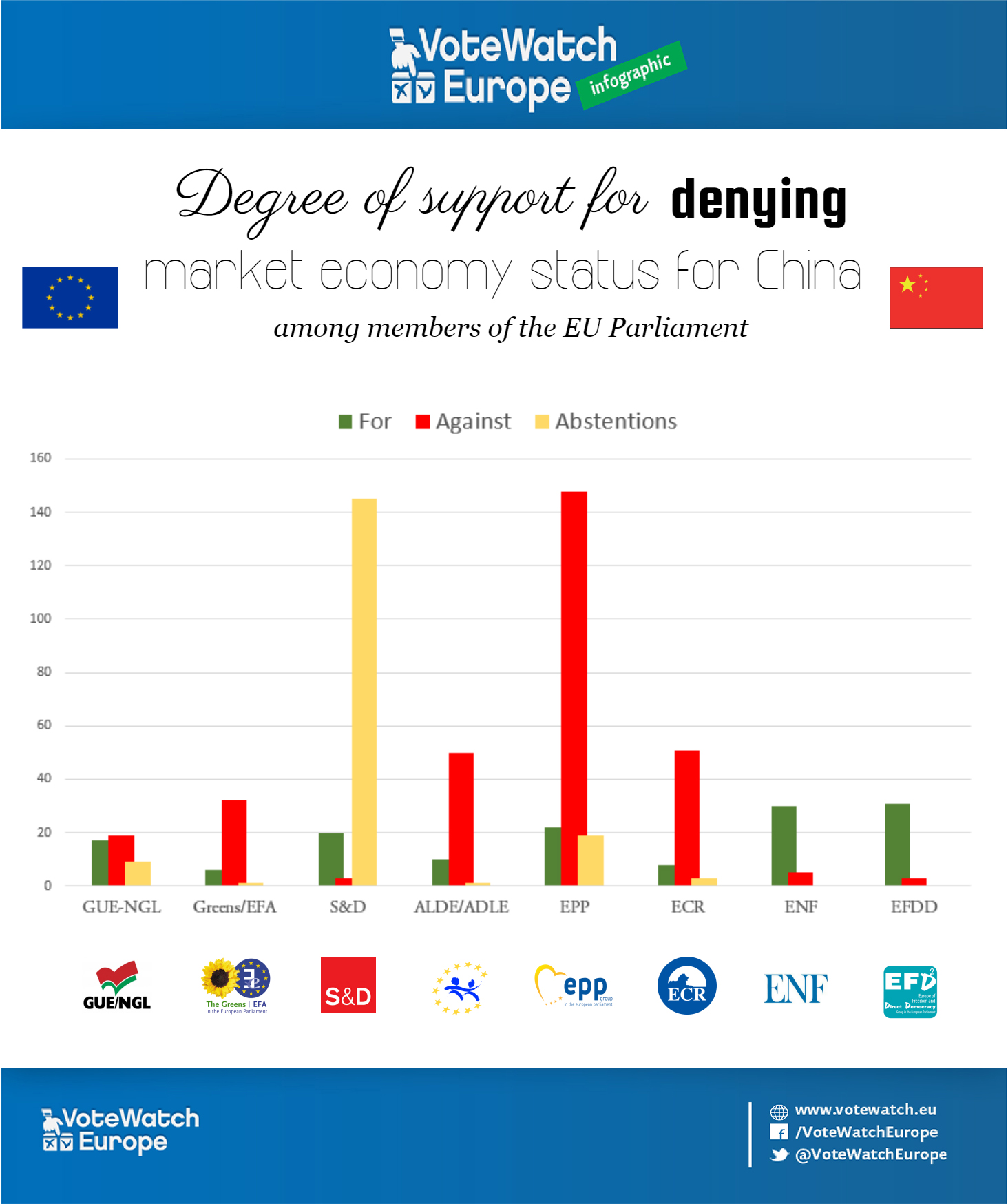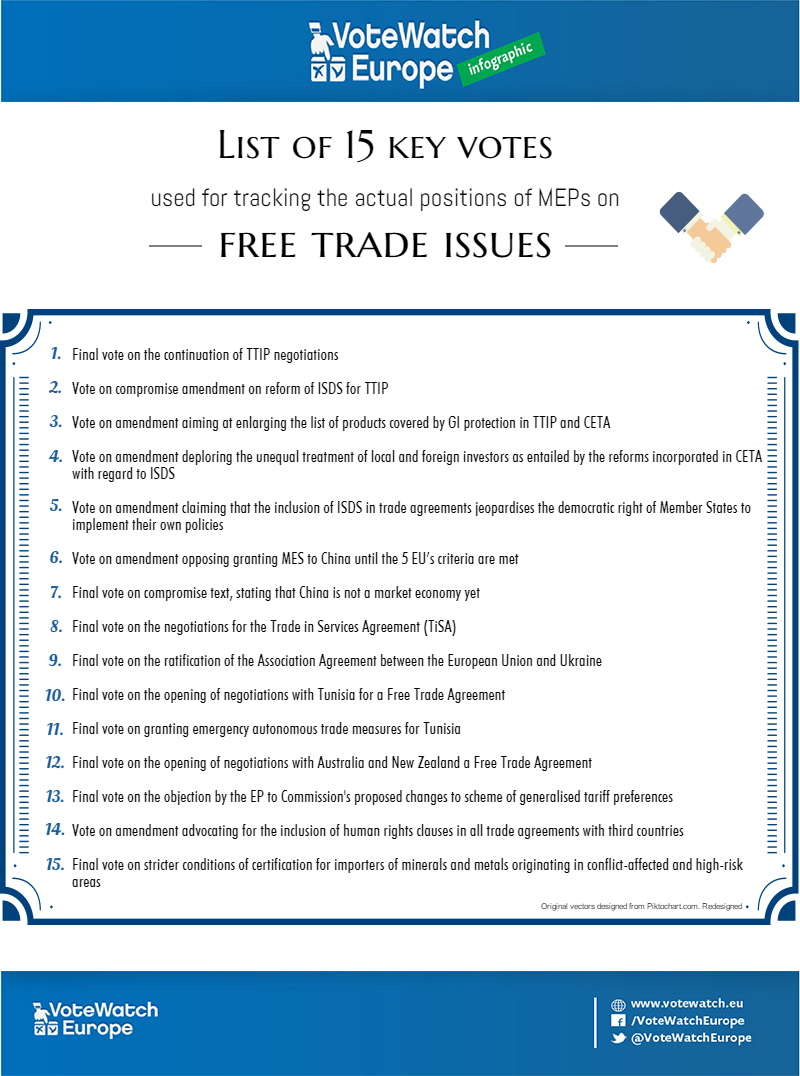Blog

Which members of the European Parliament – MEPs – are the most in favour of free trade and which, to the contrary, are the most opposed to it? Not necessarily those you might think, our latest VoteWatch Europe study shows.
We have used the European Parliament as object of analysis for two reasons. Firstly, this European institution plays an increasing role in influencing EU’s trade policy. Secondly, this institution gathers politicians from all relevant political parties across the 28 EU member states. They cast their votes on the same decisions at the same time, which gives us a unique opportunity to assess the currents of opinion on trade in all EU countries.
–
The role of the European Parliament in EU trade policy
While the EP does not play a leading role in free trade agreement negotiations, it has substantial leverage on the content of the negotiated acts. The Parliament has the power to reject the trade deal once it has been finalised. As seen in the case of the Anti-Counterfeiting Trade Agreement (ACTA), which was buried in the EP in 2012, the rejection of a done deal is not only a theoretical possibility.
More recently, the complications occurred in the ratification of the CETA testify to the increasing power of the Parliament on trade. The rejection of a trade agreement can easily turn into reality if a (political) majority of MEPs disagree with either the content of the deal or its perceived low level of transparency.
Equally important, the rejection of ACTA in 2012 has demonstrated the relatively high degree of independence of the MEPs from their own national parties and governments: although 22 out of (then) 27 EU governments had already approved ACTA, the agreement was still rejected in the EP by an overwhelming majority of politicians, many of whom belonged to the same parties in government who had signed the deal just a few months before.
The main tool through which the EP exerts its control over the trade negotiations is the intermediary resolutions that are adopted in plenary, both before the start of the negotiations, and after. These votes are highly important, because they clearly show which parts of an agreement can raise serious issues, and as a result threaten the adoption of the final deal.
Some MEPs tend to be very active and vocal. This may give the impression of a strong opposition to or support for a particular issue in the EP as a whole. These actions can sometimes create a distorted assessment to an outside observer in the absence of key data that would measure the representativeness of an opinion and the actual leverage that the MEP taking the action has.
The intermediary resolutions are a better tool to spot the balance of power in favour or against various parts of the agreement. While most of the EP monitoring work takes place in the specialised International Trade EP committee (INTA), the debates and votes in the plenary are essential for the actual measurement of the balance of power across the EU as a whole.
We have looked into 15 key trade decisions made in the current EP term over the last two years and analysed a total of over 11.000 individual votes of EU Parliamentarians (15 key decisions x 751 MEPs). Some of the votes that we analysed concern entire resolutions, whereas others regard key specific amendments. A comprehensive list of votes used for our trade assessment is available below.
We found that the main predictor of the views of the Members of the European Parliament is their affiliations to the political families. However, their nationalities, age and other personal features also play an important role and become more prominent in special cases. Below, overview of our main findings:
–
Centre-right groups ECR (European Conservatives and Reformists) and EPP (European People’s Party) are the strongest supporters of free trade – with national variations
The Conservative ECR Group is the most supportive of free trade from among the EP groups. The two largest members of this group, the Conservative Party (UK) and Law and Justice (Poland) also have an absolute majority of seats in the UK and Poland, respectively. Hence, there are strong reasons to believe that this pro-free trade attitude is reflected in the positions of their (current) national governments. However, it is worth noting that the UK’s MEPs are unlikely to hold their positions for much longer, in the aftermath of the Brexit referendum.
The EPP group is also very supportive of the EU promoting a free trade agenda, although within this group there are variations according to nationality. Quite interestingly, among the biggest national delegations in the group, the most free trade backing parties are currently governing at home (Angela Merkel’s Christian Democratic Union in Germany and Mariano Rajoy’s People’s Party in Spain), whereas the most protectionist ones (Silvio Belusconi’s Forza Italia and Nicolas Sarkozy’s The Republicans) are currently sitting in the opposition’s benches in their own countries.
The positions of the centre-left S&D group are rather flexible – hence less predictable – on trade issues. Within the S&D, the German Social Democratic Party (in power in Berlin) and the Spanish Socialist Workers’ Party are amongst the warmest embracers of free trade in the Socialist group. On the other hand, the French-speaking members of the group are the most protectionist (Socialist Party of current French President Hollande and the Belgian Socialist Party).
Somewhat in the middle, there is the largest party within the S&D group, Matteo Renzi’s Italian Democratic Party, whose position is still somewhat in favour of free trade, but varies from one topic to another.
The graphs below map the support among MEPs for upgrading trade liberalisation with two of the EU’s key partners, the United States (through TTIP) and China (through granting market economy status).
–
Central and Eastern European MEPs strongest backers of EU trade initiatives
Contrary to what some observers would intuitively be inclined to think – given historical precedents – our analysis of the most recent decision-making data shows that, overall, EU parliamentarians from countries such as the Netherlands, Sweden and the UK are not the main backers of trade liberalisation measures in the EU. From among the larger members states, the MEPs of two CEE countries, Poland and Romania, are the most supportive of trade, with the Polish ones topping the overall ranking (84% of support).
Perhaps not surprisingly, the representatives of Greece and France are the most protectionist in Europe, according to the voting records in the European Parliament. The French are notoriously strongly opposed to both granting Market Economy Status to China and to the TTIP.
Overall, a cleavage between Western and Eastern countries is noticeable, rather than a cleavage between northern and southern European countries.
–
Individuals: Poland’s Czarnecki and Britain’s McIntyre most supportive of free trade in the EP
Two MEPs have always voted in favour of free trade initiatives (among the 15 decisions considered), namely the influential member of the Polish Law and Justice, Ryszard Czarnecki, and the Tory Anthea McIntyre. At the opposite end, the Spanish far-left MEP Marina Albiol Guzmán is the ‘opposition champion’, having voted against every single measure that would make free trade easier.
–
Young MEPs are less supportive of free trade than the senior ones
The data analysis indicates that there is a sharp difference in the attitude on free trade among MEPs of different age groups. Interestingly, young MEPs are colder towards the perspective of diminishing the barriers to trade than older ones. Indeed, the youngest MEPs (18-30 years old) are the least supportive of free trade (58% support rate) among all the age groups considered. On the other hand, the oldest generation of MEP (over 60 years old) is the most supportive of free trade (67% of support rate).
Doru Frantescu is Co-founder and CEO of the think tank VoteWatchEurope, currently the most influential EU affairs platform in the on line space, according to an independent study.
To get the full version of the study, which includes a detailed and granular mapping of the views of MEPs on trade issues, contact us at: [email protected].
Also read Who holds the power in the European Parliament. Top 70 most influential MEPs.
Source: Votewatch Blog – Doru Frantescu’s Posts




Be the first to post a comment.